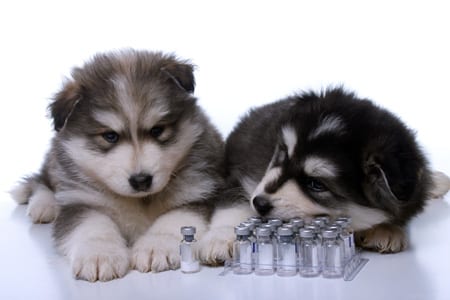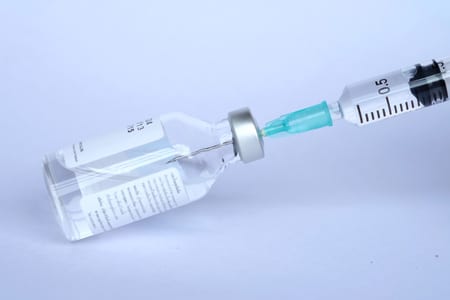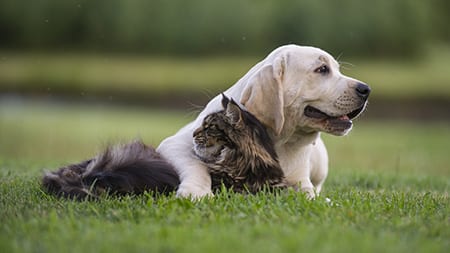Pet Vaccinations and Immunizations
 At Harmony Animal Hospital, our #1 goal is to help your canine companions and feline friends live happy and long lives. While pet vaccination is both a robust and controversial subject for humans and our pets, they remain a critical component of pet parenting. Administered to protect your pets against many life-threatening, highly contagious diseases and essential in helping keep your pets healthy, vaccines certainly do not come without risks.
At Harmony Animal Hospital, our #1 goal is to help your canine companions and feline friends live happy and long lives. While pet vaccination is both a robust and controversial subject for humans and our pets, they remain a critical component of pet parenting. Administered to protect your pets against many life-threatening, highly contagious diseases and essential in helping keep your pets healthy, vaccines certainly do not come without risks.
There are many different types of vaccines, combinations of vaccines, and many different diseases that vaccines can help protect against. There are also varying opinions on which vaccines should be given, the safety of certain vaccines, and what type of schedule to follow when administering them.
Harmony’s Philosophy
Here at Harmony, we strongly believe that all vaccinations carry benefits and risks that must be considered for each individual pet and discussed with each individual client. Our goal is to educate and provide guidance so that you can make the most informed decision on what is best for your pets based on the following:
- requirements by law
- lifestyle
- environment
- age and medical history
- travel habits
- personal beliefs about vaccines.
In agreement with the American Veterinary Medical Association (AVMA), Harmony Animal Hospital supports and highly recommends administering a series of core vaccines to healthy dogs and cats to protect your companions from preventable, often life-threatening diseases that, when contracted, cause extreme pain and suffering. We do not believe in over-vaccinating or vaccinating for diseases where your pets are at low risk of exposure.
How Do Vaccines Work?
 The premise of a vaccine is to provide exposure safely to the disease in question so that the immune system can be primed and ready to attack swiftly and effectively should your pet become exposed to the real disease, thus preventing or lessening its severity. Vaccines are made using inactivated (killed) or modified (living) parts of the virus or bacteria that causes the particular disease. The vaccine is then injected under the patient’s skin, stimulating the immune system to recognize the disease as a problem and produce antibodies to fight it.
The premise of a vaccine is to provide exposure safely to the disease in question so that the immune system can be primed and ready to attack swiftly and effectively should your pet become exposed to the real disease, thus preventing or lessening its severity. Vaccines are made using inactivated (killed) or modified (living) parts of the virus or bacteria that causes the particular disease. The vaccine is then injected under the patient’s skin, stimulating the immune system to recognize the disease as a problem and produce antibodies to fight it.
It takes between 5 and 14 days in most cases for an animal’s protection from the disease to begin after a vaccine is administered. Some vaccines take two to three doses, 3-4 weeks apart, to obtain proper immunity.. This is especially true for puppies and kittens since their immune systems are naive. Antibodies passed on to them from their mothers can interfere with the immune system’s ability to produce adequate antibodies from the vaccination administered.
Vaccinations are used to prevent diseases before exposure. Vaccinations have no effect in treating a disease once an animal has contracted it. Also, all pets need a healthy immune system for a vaccine to work. Animals should not be vaccinated while they are sick because they are already working hard to fight off whatever virus or bacteria they have, and doing so will add further strain to their compromised immune systems.
Are Any Vaccines Required By Law?
Each state, county, and city have laws governing the administration of the Rabies vaccine. Since this disease is a human health issue and fatal in almost every case, the government has made strict laws regarding Rabies vaccination in pets. Some areas require yearly Rabies vaccinations, while others call for boosting a Rabies vaccine every three years.
Here in Wake County, North Carolina, all dogs and cats require an initial one-year Rabies vaccine followed by a booster every three years. An up-to-date canine and feline rabies vaccination is a legal requirement regardless of the health status, age, or previous reaction that your pet may have had to this vaccine. Be sure to keep proof of your pet’s Rabies vaccines with their medical records.
Why Should I Vaccinate My Pets?
Vaccines are vital to your pets’ wellness and preventive medical care. They have come a long way in the last few decades and now protect your pet against many devastating and deadly diseases. Nothing is more heartbreaking than seeing a pet suffer or die from a preventable disease with proper pet vaccination.
While vaccination against Rabies is the only mandatory immunization in many cities, it doesn’t mean you should skip other vaccines. Keeping your pet protected against infectious diseases they are at risk of encountering can add many years of life to your beloved companion and a greater return on your emotional and financial investment.
However, not every pet should be vaccinated against every disease. There are a series of species-specific vaccines that are considered core for all pets because they protect our animals from serious diseases that are widespread in most areas of the world and cause high levels of morbidity (symptoms) and mortality (death). Then there are non-core vaccines that should only be recommended based on your pet’s individual lifestyle and circumstances.
Core Vaccines for Both Dogs and Cats
 Rabies – NC State law requires all dogs and cats to be vaccinated for rabies. The rabies vaccine can save your pet’s life and keep your family intact, even if your animal friends come into contact with the rabies virus. Rabies affects the central nervous system, and it has no cure. It is almost always fatal. Bats, foxes, and raccoons are the most common carriers of rabies, and animals with rabies are often aggressive, fearless, or display unusual or odd behaviors.
Rabies – NC State law requires all dogs and cats to be vaccinated for rabies. The rabies vaccine can save your pet’s life and keep your family intact, even if your animal friends come into contact with the rabies virus. Rabies affects the central nervous system, and it has no cure. It is almost always fatal. Bats, foxes, and raccoons are the most common carriers of rabies, and animals with rabies are often aggressive, fearless, or display unusual or odd behaviors.
Core Vaccines for Dogs
Canine Parvovirus Infection (CPV)
Vaccination for Canine parvovirus prevents fatal pet illnesses. Canine parvovirus is highly contagious. It is spread through feces or contact with contaminated items like water bowls and bedding. The virus is highly resistant, allowing it to live in its environment for months. It can cause cardiac damage, intestinal distress (extreme vomiting, anorexia, diarrhea, and bloody stool), and deadly dehydration. We consider this an essential vaccine as there are presently no drugs available to kill this virus once it is contracted, although your pet may recover with intensive treatment in a veterinary hospital. However, treatment isn’t always successful, and when it is, it is always expensive (hundreds to thousands of dollars) to obtain successful results due to the time-consuming and intense hospitalization these dogs require.
Canine Distemper Virus (CDV)
Canine distemper is caused by a virus that is often fatal. It is airborne, just the same as a common cold. Symptoms of canine distemper include neurological problems, fever, vomiting, and upper respiratory symptoms. There is no antiviral drug to treat canine distemper, which is why vaccinating against it can save your dog’s life.
Canine Adenovirous-2 Infections (CAV-2)
Canine adenovirus comes in 2 forms: Type 1, which causes severe to fatal liver disease, and Type-2, which causes respiratory disease that can lead to pneumonia and death. It is also one of the causes of canine cough. Both viruses are very contagious, and a dog of any age can be infected through saliva, mucous, feces, or urine. In the latter, it can continue to be released for up to 9 months in the urine after recovery from the infection. Neither of these viruses spreads to cats or humans. At Harmony, we use the CAV-2 vaccine because it is less likely to cause side effects than CAV-1 and is similar enough to CAV-1 to create immunity for both.
Core Vaccines for Cats
Feline Parvovirus (FPV)
Feline Parvovirus, also known as Feline Distemper or Feline Panleukopenia virus (FPV), is life-threatening. Cats who contract feline parvovirus often die of dehydration due to diarrhea or secondary infections that result from a compromised immune system. Symptoms include diarrhea (often bloody), vomiting, loss of appetite, fever, and lethargy. We consider this an essential vaccine as there are presently no drugs available to kill this virus once it is contracted.
Feline Viral Rhinotracheitis (FVR)
Feline Viral Rhinotracheitis is commonly referred to as feline flu or feline pneumonia. It is an upper respiratory infection caused by and also known as Feline Herpesvirus-1 Infection (FHV-1). FVR is responsible for more than one-half of all respiratory diseases in cats worldwide. Symptoms include sneezing and congestion, nasal and eye discharge, inflammation of the eyelid, eye ulcers, squinting, drooling, fever, loss of appetite, and lethargy.
Once contracted, FVR is known to produce periodic flare-ups that include severe upper respiratory symptoms over the lifetime of your pet. And, while some infected cats are asymptomatic, all infected shed the virus continuously to other cats. While this is not a disease that cats can pass to people, people can pass it between cats by touching an infected cat and then touching a non-infected cat.
Feline Calicivirus Infection (FCV)
Feline Calicivirus Infection is the second of the two important causes of respiratory infections in cats. It is highly contagious in unvaccinated cats and can occur in cats of any age. However, kittens over six weeks old are the most susceptible. FCV is resistant to disinfectants, so your cat may come into contact with the virus in almost any environment. Symptoms include nasal and eye discharge, loss of appetite, fever, ulcers in or around the mouth and nose as well as around claws, painful walking, or lameness.
Non-Core Vaccines
Non-core vaccines are only given strategically when a particular disease is prevalent in an area or when circumstances predispose to the appearance of the disease. Where you live, your pet’s lifestyle, and risk of exposure will determine whether your pet needs one or more non-core vaccines.
Non-Core Vaccines for Dogs include:
- Bordetella bronchiseptica – This vaccine can be given as an intranasal (often paired with adenovirus and parainfluenza) or as an individual vaccine given orally or as an injection. The vaccine helps protect against a wide variety of respiratory diseases, often grouped together and called “kennel cough.”
- Canine influenza virus – This is a new virus that didn’t appear until 2004. Until early 2015 the H3N8 virus only existed in certain populations of dogs (i.e., racing greyhounds) in limited parts of the country. The new strain of the flu H3N2 has proven to be much more of a concern to pet populations. Both strains of the Canine Flu are highly contagious between dogs and cause upper respiratory problems, including coughing, eye discharge, sneezing, and nasal discharge. Some dogs might develop pneumonia. To date, there are no cases of either strain of Canine Flu going from dogs to people; however, there have been a few reported cases from dogs to cats.
- Leptospira – Leptospirosis is a severe and life-threatening disease that can be passed between animals and people. In both humans and dogs, it causes flu-like symptoms and can damage the liver and kidneys. It is a spirochete bacteria with a worldwide distribution. Though it has higher incidence rates in tropical climates, especially after heavy rainfall or flooding, we see several cases here per year in North Carolina because it is shed by infected urine and fluids in wildlife, with a particularly high incidence in raccoons and deer. So if these wild animals are in the same areas where your dogs are, it is recommended to vaccinate to help keep them and you protected from this disease.*Note: Years ago, this vaccine was associated with a high rate of vaccine reaction, but modifications and improvements over the past several years have drastically reduced the possibility and severity of adverse reactions we see in dogs after receiving this vaccination.
- Borrelia burgdorferi – This is a vaccine against Lyme disease which is a bacteria carried by ticks. This disease can be very serious in dogs and is often a life-long infection once contracted. It cannot go between dogs and people since this bacterial disease is only transmitted via a direct tick bite. Although we do not see many cases of Lyme disease in Apex, NC, if you travel to the Northeast or Midwest, or to the mountains or coast with your dog, you should consider this vaccine. And please, regardless of your dog’s vaccination status, always be diligent about using appropriate and regular flea and tick preventives for your dogs all year round.
- Canine coronavirus – This virus has been known to cause diarrhea and respiratory disease in young puppies. It is considered a mild infection with a very low morbidity and mortality rate. It is an unnecessary vaccine, especially for adult dogs who easily develop natural immunity to this virus.
Non-Core Vaccines for Cats include:
- Feline leukemia virus (FeLV) – It is recommended to give this vaccine to kittens since they are most susceptible to this deadly virus, and their lifestyle can change, bringing them into contact with other cats and/or the outdoors. It is also recommended for cats who go outside since their risk is higher. Indoor-only adult cats who do not come into contact with any other cats do not need this vaccine.
- Feline immunodeficiency virus – FIV is a virus we call “Kitty AIDs” as it is similar to HIV in humans. It is not transmissible between cats and people but is transmitted between cats via saliva (ie bite wounds) and other bodily fluids (i.e., mating). The vaccine is not considered effective and can create false negative results on testing. Therefore, pet vaccination for this condition is not recommended.
- Chlamydia felis. This vaccine helps protect against conjunctivitis and severe upper respiratory disease in cats, but it’s not always effective, does not eliminate shedding of the virus between cats, and has a high rate of vaccination reaction. For these reasons, this vaccine is reserved for large populations of cats that are housed together (i.e., shelters and catteries) where this disease has been discovered.
- Bordetella bronchiseptica. This vaccine is the same in cats as it is in dogs. It helps protect against virus-causing upper respiratory symptoms in cats. It is not a common or severe disease in cats and is reserved for cats who are in close, frequent contact with large populations of other cats where this virus has been discovered.
Aren’t Vaccines Dangerous?
Used properly and administered with the direct supervision of a veterinarian, vaccines are not typically dangerous. However, vaccines purchased over the counter or online can be extremely dangerous for your pets. The FDA has found counterfeit, unapproved, expired drugs through these outlets. Before administering any vaccine, a veterinarian should physically examine your pet to make a proper diagnosis. To protect the health and well-being of your pet and your pocketbook long-term, see your veterinarian and allow us to guide you.
Vaccines play a vital role in the battle against canine and feline infectious diseases. However, as with any medical procedure, there is a small chance of side effects and complications. Because immunizations mildly stimulate an animal’s immune system in order to create protection from specific infectious diseases, allergic reactions can occur. They are rare, most often short-lived, and mild. The most common side effects of vaccination include facial swelling, hives, pain at the injection site, diarrhea, fever, loss of appetite, and/or vomiting. In even rarer situations, vaccines can lead to immune-mediated diseases that can be difficult to treat and fatal.
It is important to talk to your veterinarian about your pet’s medical history before receiving vaccinations. If you are concerned about the overuse of vaccines, talk to our staff about your options. Chances are your pet may not need non-core vaccines.
When Should My Puppy Or Kitten Receive Vaccinations?
 Puppies and kittens must be vaccinated at 3-4 week intervals, starting around 7-8 weeks of age. If your puppy and/or kitten is between 7-10 weeks of age at their first visit, we recommend administering three rounds of vaccines, with the last vaccine being due when your puppy or kitten is between 14-16 weeks of age. This last vaccine is the most critical in the puppy/kitten series since it is when maternal antibodies are unlikely to interfere with the vaccine’s immunity.
Puppies and kittens must be vaccinated at 3-4 week intervals, starting around 7-8 weeks of age. If your puppy and/or kitten is between 7-10 weeks of age at their first visit, we recommend administering three rounds of vaccines, with the last vaccine being due when your puppy or kitten is between 14-16 weeks of age. This last vaccine is the most critical in the puppy/kitten series since it is when maternal antibodies are unlikely to interfere with the vaccine’s immunity.
It’s vital that you don’t miss any of these early rounds of the kitten/puppy series. Without them, your puppy/kitten won’t be fully protected since these first few months of life are when the diseases are most likely to cause high rates of morbidity and mortality.
After the initial round of puppy and kitten vaccines, your pet needs to receive boosters as adults. Vaccines can be given every one, two or three years, depending on the type of vaccine, the risk of the disease for your pet, the legal requirements (Rabies), and the health status of your pet. This decision should be made between you and your veterinarian based on your pet’s individual needs.
What Should I Do if I Think My Pet Is Having an Adverse Reaction to a Vaccine?
If you suspect your pet is having any reaction to a vaccine – especially if he or she is having difficulty breathing, collapses, or has swelling – call your veterinarian immediately. If you are a client of Harmony Animal Hospital, please call us during open business hours at (919) 303-3456 or on our after-hours emergency line at (919) 376-5289.
At Harmony Animal Hospital, we are here for you and your pet. When it comes to vaccines, our mission is to find the right balance between keeping your pet protected and limiting the risks that can occur with vaccinations.
Contact us today if you have questions or want to ensure your pet is up-to-date on vital pet vaccinations.


